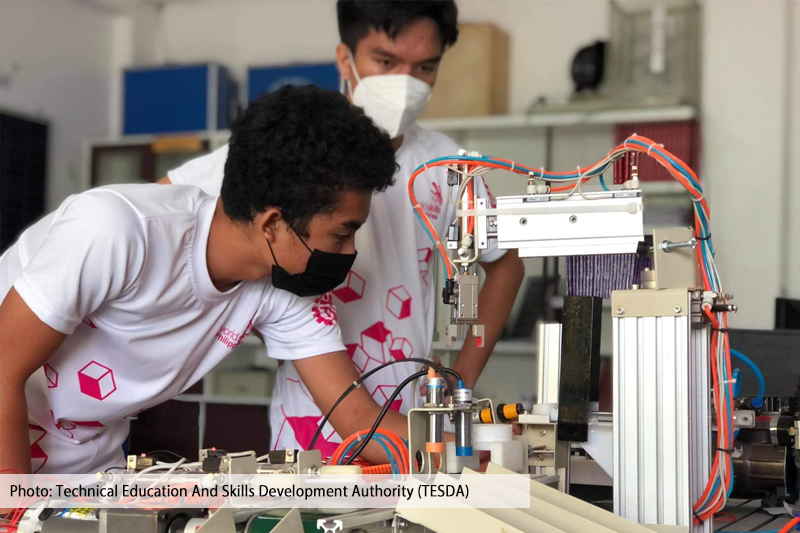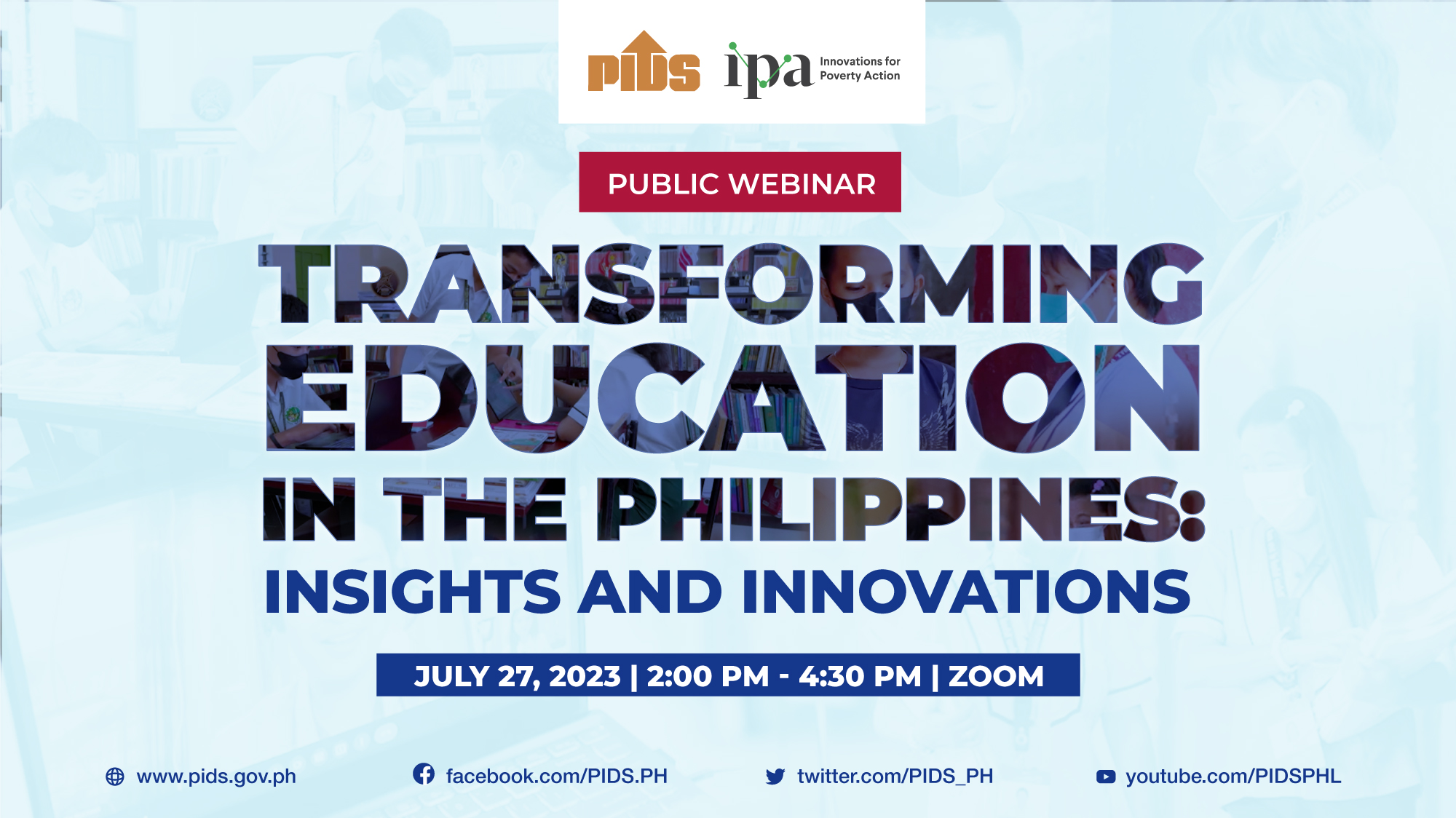Part Two
A decade ago, Filipino Alethea Florido sounded off the centuries-old belief ingrained in the minds of the country’s middle class.
At the University of North Carolina at Chapel Hill in 2006, Florido noted the deep influence of US colonial rule.
“Filipinos internalized the American ideal of a democratic society in which individuals could get ahead through attainment of a good education,” the Charlotte-Meck Schools Visiting International Faculty Program member said in a conference on K to 12. “Middle-class parents make tremendous sacrifices in order to provide secondary and higher education for their children.”
Attaining the former goal has been alleviated by the Free Public Secondary Education Act of 1988. Persistence of poverty, however, has made it difficult for the middle class to attain the latter goal for their children.
This may be one of the reasons there are at least 50 pending bills in the House of Representatives that seek to provide full free tertiary education in state universities and colleges (SUCs).
Salceda bill
THERE is House Bill 2772 being forwarded by Albay Rep. Joey S. Salceda which seeks to provide a “study-now, pay-later” system.
Salceda’s bill seeks to provide loan assistance for Filipino taking up any four to five year bachelor’s degree program in any private higher education institutions (HEIs).
“This is based on the guiding principle—kapag may pinag-aralan, magkakatrabaho at makakabayad [An educated person has the ability to get a job and pay],” Salceda said. “Thus, the entire educational system should be compelled to be effective and efficient in producing graduates for jobs created, good jobs of the future here and abroad.”
According to Salceda, the bill has two components. One is free public tertiary or higher education to all qualified students enrolled in any bachelor’s degree and technical-vocational programs offered in all SUCs. The second component is the establishment of what he calls the system of Higher Education Contribution (HEC).
HEC system
THE bill refers to HECs as the entire system wherein the government provides a loan to Filipino citizens who seek higher education, mainly four-year or five-year courses in private HEIs and local community colleges.
Repayment is collected by the Social Security System, Government Service Insurance System and other mechanisms on top of monthly premium contributions and is based as percentage of their monthly income once their income reaches a certain level.
“While free public tertiary education is straightforward, its absorptive capacity is limited and there is a need to level the playing field to those who would find admission in private higher education institutions,” Salceda said. “Thus, the HEC is designed, and hereby established, to grant concessional loans to and collect repayments from Filipinos, from students who are admitted and enrolled in private colleges and universities.”
The lawmaker added there are only few qualifications to HECs.
“The qualifications are only admission, Filipino citizenship and family income.”
According to Salceda, neither the Comissionn on Higher Education nor HEIs can impose additional qualifications, including, among others, choice of course.
“If the number of application exceeds the HEC budget, applicants will be chosen on a ‘first-come, first-serve’ basis,” Salceda said.
Repayment scheme
UNDER the system, Salceda said Filipino students enrolled in accredited HEIs who desire to avail themselves of HECs would have the education loan assistance deducted or credited to their billing at the beginning of each semester for the next eight to 10 semesters based on their baccalaureate courses.
“The private HEIs would submit a list of their total HECs releases at the end of each of semester and the HECs would after verification reimburse the amount to the HEIs,” he said.
The bill said the HEC loan will then be repaid by the beneficiaries once they find employment.
Moreover, payments will be triggered only once their gross income reaches the compulsory repayment threshold, which is the minimum amount of annual gross income.
“In short, ‘no job, no repayment,’” Salceda said.
The bill said HECs would be institutions owned and controlled by the government. These institutions would manage the higher- education loan fund, which shall be funded initially by the national government through national appropriations which may take eight years of continuous contribution of at least P30 billion annually, according to Salceda.
The government shall seek long- term funding from bilateral and multilateral institutions, which provide deeply concessional interest rates, multiyear releases with tenor up to 30 years, he added.
Substantial returns
FOR many individuals, the economic returns to education are substantial, as well, Salceda said, citing data from government think tank Philippine Institute for Development Studies.
He said in 2014 the medial daily earnings of college graduates were 116 percent higher than the earning of high-school graduates. The latter’s medial daily earnings, on the other hand, are 26 percent higher than those who only graduated from basic education.
“Even those with college units enjoy a 27-percent advantage over those with secondary education,” Salceda said. “These differentials are large and have been growing.”
Forever young
ANOTHER bill turns to the Baby Boomers. Lakas Rep. Yedda Marie Kittilstvedt-Romualdez of Leyte has proposed a law granting full scholarships to undergraduate senior citizens.
Romualdez, vice chairman of the House Committee on Government Enterprises and Privatization, said her bill would help undergraduate senior citizens to improve their lives by giving them the chance and opportunity to finish their four-year degree in any SUC.
“Education of the elderly is a must, as it leads to improvement in the quality of their lives, influences their self-esteem, their feeling of accomplishment and self-realization, while providing the younger generations with the opportunity to take advantage of the experiences of the seniors,” House Bill (HB) 3704, or the Senior Citizen Scholarship Act of 2016, said.
“It is my personal appeal to all of you to make this a reality for our country’s senior citizens with the passage of HB 3704,” Romualdez asked fellow legislators.
“The primary objective of this bill is to protect and promote the constitutionally upheld right to quality education and to ensure that education is accessible to all, without discrimination on the basis of age,” she added.
According to her, senior citizens are a valued part of Filipino society.
“In fact, the Constitution promotes not only their well-being and social security, but, more important, their continued personal growth and development.”
Under her measure, a senior citizen will be given automatic full scholarship in the form of free tuition in an SUC.
A decade ago, Filipino Alethea Florido sounded off the centuries-old belief ingrained in the minds of the country’s middle class.
At the University of North Carolina at Chapel Hill in 2006, Florido noted the deep influence of US colonial rule.
“Filipinos internalized the American ideal of a democratic society in which individuals could get ahead through attainment of a good education,” the Charlotte-Meck Schools Visiting International Faculty Program member said in a conference on K to 12. “Middle-class parents make tremendous sacrifices in order to provide secondary and higher education for their children.”
Attaining the former goal has been alleviated by the Free Public Secondary Education Act of 1988. Persistence of poverty, however, has made it difficult for the middle class to attain the latter goal for their children.
This may be one of the reasons there are at least 50 pending bills in the House of Representatives that seek to provide full free tertiary education in state universities and colleges (SUCs).
Salceda bill
THERE is House Bill 2772 being forwarded by Albay Rep. Joey S. Salceda which seeks to provide a “study-now, pay-later” system.
Salceda’s bill seeks to provide loan assistance for Filipino taking up any four to five year bachelor’s degree program in any private higher education institutions (HEIs).
“This is based on the guiding principle—kapag may pinag-aralan, magkakatrabaho at makakabayad [An educated person has the ability to get a job and pay],” Salceda said. “Thus, the entire educational system should be compelled to be effective and efficient in producing graduates for jobs created, good jobs of the future here and abroad.”
According to Salceda, the bill has two components. One is free public tertiary or higher education to all qualified students enrolled in any bachelor’s degree and technical-vocational programs offered in all SUCs. The second component is the establishment of what he calls the system of Higher Education Contribution (HEC).
HEC system
THE bill refers to HECs as the entire system wherein the government provides a loan to Filipino citizens who seek higher education, mainly four-year or five-year courses in private HEIs and local community colleges.
Repayment is collected by the Social Security System, Government Service Insurance System and other mechanisms on top of monthly premium contributions and is based as percentage of their monthly income once their income reaches a certain level.
“While free public tertiary education is straightforward, its absorptive capacity is limited and there is a need to level the playing field to those who would find admission in private higher education institutions,” Salceda said. “Thus, the HEC is designed, and hereby established, to grant concessional loans to and collect repayments from Filipinos, from students who are admitted and enrolled in private colleges and universities.”
The lawmaker added there are only few qualifications to HECs.
“The qualifications are only admission, Filipino citizenship and family income.”
According to Salceda, neither the Comissionn on Higher Education nor HEIs can impose additional qualifications, including, among others, choice of course.
“If the number of application exceeds the HEC budget, applicants will be chosen on a ‘first-come, first-serve’ basis,” Salceda said.
Repayment scheme
UNDER the system, Salceda said Filipino students enrolled in accredited HEIs who desire to avail themselves of HECs would have the education loan assistance deducted or credited to their billing at the beginning of each semester for the next eight to 10 semesters based on their baccalaureate courses.
“The private HEIs would submit a list of their total HECs releases at the end of each of semester and the HECs would after verification reimburse the amount to the HEIs,” he said.
The bill said the HEC loan will then be repaid by the beneficiaries once they find employment.
Moreover, payments will be triggered only once their gross income reaches the compulsory repayment threshold, which is the minimum amount of annual gross income.
“In short, ‘no job, no repayment,’” Salceda said.
The bill said HECs would be institutions owned and controlled by the government. These institutions would manage the higher- education loan fund, which shall be funded initially by the national government through national appropriations which may take eight years of continuous contribution of at least P30 billion annually, according to Salceda.
The government shall seek long- term funding from bilateral and multilateral institutions, which provide deeply concessional interest rates, multiyear releases with tenor up to 30 years, he added.
Substantial returns
FOR many individuals, the economic returns to education are substantial, as well, Salceda said, citing data from government think tank Philippine Institute for Development Studies.
He said in 2014 the medial daily earnings of college graduates were 116 percent higher than the earning of high-school graduates. The latter’s medial daily earnings, on the other hand, are 26 percent higher than those who only graduated from basic education.
“Even those with college units enjoy a 27-percent advantage over those with secondary education,” Salceda said. “These differentials are large and have been growing.”
Forever young
ANOTHER bill turns to the Baby Boomers. Lakas Rep. Yedda Marie Kittilstvedt-Romualdez of Leyte has proposed a law granting full scholarships to undergraduate senior citizens.
Romualdez, vice chairman of the House Committee on Government Enterprises and Privatization, said her bill would help undergraduate senior citizens to improve their lives by giving them the chance and opportunity to finish their four-year degree in any SUC.
“Education of the elderly is a must, as it leads to improvement in the quality of their lives, influences their self-esteem, their feeling of accomplishment and self-realization, while providing the younger generations with the opportunity to take advantage of the experiences of the seniors,” House Bill (HB) 3704, or the Senior Citizen Scholarship Act of 2016, said.
“It is my personal appeal to all of you to make this a reality for our country’s senior citizens with the passage of HB 3704,” Romualdez asked fellow legislators.
“The primary objective of this bill is to protect and promote the constitutionally upheld right to quality education and to ensure that education is accessible to all, without discrimination on the basis of age,” she added.
According to her, senior citizens are a valued part of Filipino society.
“In fact, the Constitution promotes not only their well-being and social security, but, more important, their continued personal growth and development.”
Under her measure, a senior citizen will be given automatic full scholarship in the form of free tuition in an SUC.












